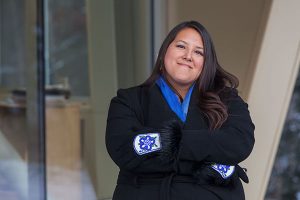UAA engineering professor Michele Yatchmeneff honored with NSF Career Award
by Michelle Saport |

Michele Yatchmeneff received the Faculty Early Career Development Award from the National Science Foundation.
The National Science Foundation recently awarded its Faculty Early Career Development Award to Dr. Michele Yatchmeneff, an ANSEP alumnus and mentor as well as an engineering professor at University of Alaska Anchorage. The $500,000 research grant, the third NSF grant in Yatchmeneff's relatively young career, will advance a study on the importance of belonging in Alaska Native STEM education.
Over the next five years, Yatchmeneff will use the NSF Faculty Early Career Development Award to collect data through qualitative interviews with Alaska students and professors. Yatchmeneff and her team will develop a series of publications for a new professional development course aimed at informing primary educators in how to build a sense of belonging for Alaska Native students. According to Yatchmeneff, an Unangax (Aleut) woman who grew up in remote rural villages along Alaska's Aleutian chain, this belongingness is a factor she, and many of the students she now teaches, have experienced, leading to her theory that a sense of belonging plays a crucial role in academic success.
"When I started my Ph.D. program at Purdue, I didn't realize the type of opposition I would face. Many students and professors treated me like a minority quota instead of a deserving candidate who earned her way there," said Yatchmeneff. "That further sparked my interest in understanding the social dynamics of my college environment and how it can impact success. From there I became passionate about what drives a sense of belonging among minority students, and I'm thankful for the opportunity to continue that important research with the support of the National Science Foundation."
While pursuing her doctorate at Purdue University, Yatchmeneff conducted extensive research and found that not only was lack of access to a STEM education a factor for Alaska students, there was also limited motivation to pursue STEM-focused degrees and higher education. With support from NSF, she studied the incentive factors of students who participated in college readiness programs and found that ANSEP students gained a sense of autonomy, competence and relatedness that better prepared them for college. In addition to advancing students academically, ANSEP created a sense of community that also prepared them emotionally. Her key finding was that Alaska Natives and other minority students need a sense of belonging in order to successfully pursue STEM degrees.
In the fall of 2015, Yatchmeneff and fellow ANSEP alum Dr. Matt Calhoun made history at University of Alaska Anchorage as the first tenure-track Alaska Native engineering faculty members. They are currently teaching engineering courses to develop the next generation of STEM professionals in Alaska in addition to serving as mentors for current ANSEP students. Passionate about continuing her research on Alaska Native education, Yatchmeneff now hopes to identify the key characteristics Alaska Natives associate with belonging as well as how that influences their decision to pursue higher level math and science courses over the next five years.
"ANSEP is very proud of the work Michele is doing to break down the barriers that unrepresented students face in education," said ANSEP Founder and Vice Provost Dr. Herb Ilisaurri Schroeder. "From growing up in rural Alaska to earning a doctorate degree to becoming an educator, Michele is empowering Alaska students and inspiring them to follow in her footsteps to build a stronger future for our state."
 "UAA engineering professor Michele Yatchmeneff honored with NSF Career Award" is licensed under a Creative Commons Attribution-NonCommercial 4.0 International License.
"UAA engineering professor Michele Yatchmeneff honored with NSF Career Award" is licensed under a Creative Commons Attribution-NonCommercial 4.0 International License.









